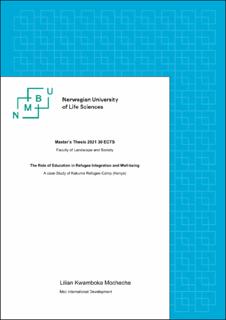| dc.contributor.advisor | Eriksen, Siri Ellen Hallstrøm | |
| dc.contributor.author | Mocheche, Lilian Kwamboka | |
| dc.coverage.spatial | Kenya | en_US |
| dc.date.accessioned | 2021-12-16T13:49:50Z | |
| dc.date.available | 2021-12-16T13:49:50Z | |
| dc.date.issued | 2021 | |
| dc.identifier.uri | https://hdl.handle.net/11250/2834751 | |
| dc.description.abstract | With wars and climate issues on the rise in the present days, many people are being displaced from their homes and their countries thus increasing the numbers of refugees globally. For these and many other reasons, issues surrounding refugees have become an important aspect both nationally and globally. Now more than ever before actors involved are striving to come up with policies and strategies that are meant to enhance cohesion and co-existence between refugees and host communities and for integration to be allowed. This is a study that analyzes the role of education in the integration and well-being of refugees in Kakuma Refugee Camp in Kenya.
The research used qualitative methods for data collection. Primary data was collected using in-depth interviews with informants in the camp both refugees and humanitarian workers. The informants were selected through snow-ball non-probability sampling. Secondary data was sourced from literature works, articles and journals on refugee integration and education. The main themes that answered the research research questions are: The role of education in refugee well-being, policy implementation and development in accessing national system education, equity in access to education, labor standards and equality between refugees and non-refugees workers and lastly, integration through tertiary education. The study uses the integration framework by Ager and Strang and the acculturation theory to conceptualize and analyze the findings.
From the in-depth interviews with the informants the study established that education with the camp plays an important role in the refugees well-being because it is through scholarships that refugees get a chance to go and be integrated into the national system of education. Education also enables the refugees to find opportunities for employment thus enhancing their lives. However, education has as well been depicted as a source of discrimination and inequality through policies that discredit the refugee’s previous education forcing them to start in lover levels, an issue that causes demoralization among the refugees. Apart from education, the feedback from informants established a dissatisfaction among them on the way employment policies regarding refugee remuneration are carried out. The explanation that refugees are paid less than their non-refugee colleagues because they receive humanitarian support does not resonate well with the refugees. In conclusion, the study agrees that as much as integration is always positive, education plays an important role in the process and well-being of refugees too. | en_US |
| dc.language.iso | eng | en_US |
| dc.publisher | Norwegian University of Life Sciences, Ås | en_US |
| dc.rights | Attribution-NonCommercial-NoDerivatives 4.0 Internasjonal | * |
| dc.rights.uri | http://creativecommons.org/licenses/by-nc-nd/4.0/deed.no | * |
| dc.subject | Integration | en_US |
| dc.subject | Refugees | en_US |
| dc.subject | Education | en_US |
| dc.subject | Well-being | en_US |
| dc.title | The role of education in refugee integration and well-being : a case study of Kakuma refugee camp (Kenya) | en_US |
| dc.type | Master thesis | en_US |
| dc.subject.nsi | VDP::Social science: 200 | en_US |
| dc.description.localcode | M-DS | en_US |

